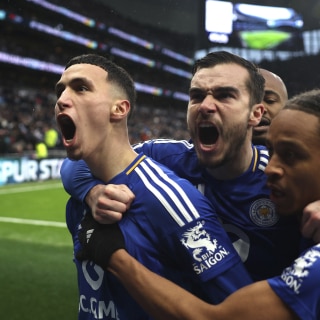
This week, I reflect on 10 years of the Premier Skills English podcast, looking back at the highlights of the last 800 episodes and leave you with a football English quiz.
Big football phrase quiz
Can you work out my favourite football words and phrases? There are loads more fantastic football phrases, but these are some that I like and are some of the phrases that we have used to quiz you at the end of the Premier Skills English podcast.
Number 1. (******)
This word is used to describe an act that skilled players can use to get past an opponent, usually a defender and that has the advantage of humiliating their opponent at the same time. It comes from a time when the original meaning of this word referred to a very valuable spice. It was so valuable that sneaky traders would try to trick customers by passing wooden replicas off as the real items. This sense of deception has spread into football and now this move, this trick is probably more commonly used by football fans than by cooks and chefs. #
Number 2. (******** ****)
While a pass is usually a helpful act, this one is the opposite. It’s a poorly judged ball played to a teammate who is about to be tackled by an opponent. The receiver has no time to prepare before impact, and the name of this treacherous pass refers to the most likely destination for the player on the receiving end of the inevitable crunching tackle.
Number 3. (******* *** ****)
This phrase perfectly captures the extreme tension and anxiety felt by fans and players during the final, decisive moments of a match or a league season. It was famously invented by a legendary Scottish manager of a top Manchester club, who used it to describe the sound of nervous fans shuffling in their plastic stadium seats.
Number 4. (*** ****)
In football, this describes the dreadful act of scoring against your own team. However, the phrase is now more commonly used outside of sport. It has become a powerful metaphor in politics and daily life to describe any action or statement that backfires and ends up harming the very cause it was meant to support.
Number 5. (*****)
This word is used for a match between two fierce local rivals. The term likely comes from a town in the English Midlands, famous for a Shrovetide football match that was so chaotic it was almost a riot. This word is especially tricky because of its pronunciation. It looks like it should sound quite different, but somehow has preserved the ancient way of saying e-r.
Number 6. (*******)
This is a word for a dreadful, obvious, and often comical mistake made by a player, especially a goalkeeper. It's the kind of error that makes the crowd groan, like fumbling a simple catch or letting a weak shot trickle into the net. The word itself sounds clumsy and loud, evoking the noise of dropping something heavy by accident.
Number 7. (******)
This is a very common, informal name for a football manager. The word’s origins, however, have nothing to do with sport. It's an old English term, a shortened version of "godfather," that was used to respectfully refer to an elderly man or, more importantly, the foreman in charge of a group of workers. The name carried over into the industrial world of early football, and it has stuck ever since.
Number 8. (***-*****)
Every football fan knows this means one player scoring three goals in a game. But the term didn't come from football. It was born in the sport of cricket in the 1850s. A bowler who managed the incredible feat of taking three wickets with three consecutive balls was rewarded by the fans, who would hold a collection to buy him one of these brand new items of headwear.
Number 9. (******** *******)
This describes a dominant player in the centre of the pitch who controls the flow of the game, issues orders, and leads their team. The term is a military metaphor, comparing the player to a high-ranking army officer who commands their troops, dictates the strategy, and masterminds the victory from the heart of the battlefield.
Number 10. (*******)
This term describes one of the most audacious things a player can do in the highest-pressure situation imaginable: a penalty kick. Instead of blasting the ball, the player performs a delicate chip straight down the middle, gambling that the goalkeeper will have already dived. The move gets its name from the Czechoslovakian midfielder who bravely and brilliantly executed it for the first time to win the 1976 European Championship final.
If you can work out the answers to these 10 football phrase puzzles, leave them in the comments on the Premier League British Council website.

All good things must come to an end.
Goodbye
Thank you all for listening to the Premier Skills English podcast. It has been so much fun making these and reading your responses over the years. There are 834 episodes of the podcast online so if you ever want to listen again, you can find hours and hours of football and English and some silly roleplays.
So now all that is left is for me to say that I hope all of you stay fit and healthy and safe.
Goodbye for now and enjoy the football.
Log in or register to post comments
Hi Jack, we have a saying; "Everything that has a beginning has an end”. While following your podcasts I wrote down all the words and phrases that I didn't hear before. Thanks for your efforts.May Allah (=God) bless you and your family.
Note:
Keepers in Premier League “Onana” and “Ederson” have been transferred to the Turkish teams this season. Thus, M.United's keeper “Altay” has catched an opportunity to escape from the bench:-)
Football words and phrases
Number 1. Nutmeg, Number 2. Hospital pass, Number 3.Squeaky Bum Time, Number 4.Own goal, Number 5.Derby, Number 6.Clanger, Number 7. Gaffer Number 8.Hot-Trick, Number 9. Midfield general, Number 10.Panenka
My favourite football phrases:
Number 1.********
A free player who far from opponents and can be at the any zone of the pitch, and has enough space to receive her/his teammate pass.
Number 2. ******* ****
An attractive and spectacular shoot generally made by striker in front of opponent goal while falling on the pitch. On this shoot, the ball goes over her/his head. We call it Rövaşata an Italian originated word “Rovesciata” this position.
Number 3. ** *****
It’s a verb. As a last chance, removing the ball away from the goal line by defender when the keeper misses it. It aims getting the ball out of danger zone not to pass when opponent team made a counter-attack.
(Funny Turkish phrase:-) Number 4. *****
It’s Spanish originated word means friend but we use it for a person who voluntarily encourages fans for cheering and chanting. Leader of Tribunes or Cheer Leader are another names of this person.
*Note from Jack. Hsn included the answers to his football phrases, but I think that it's best to hide them in case anyone else can work them out.
Awww. I have been listening to you guys for over six months since I thought it is best way for me to practice my english and increase my football vocabulary. I wanna especially thank you for efforts you put to make me interested in learning english without letting me bored. I hope you would be active with us in some form and give us quizes on and off.













The Best of Luck, Jack! Have a nice this and following years!